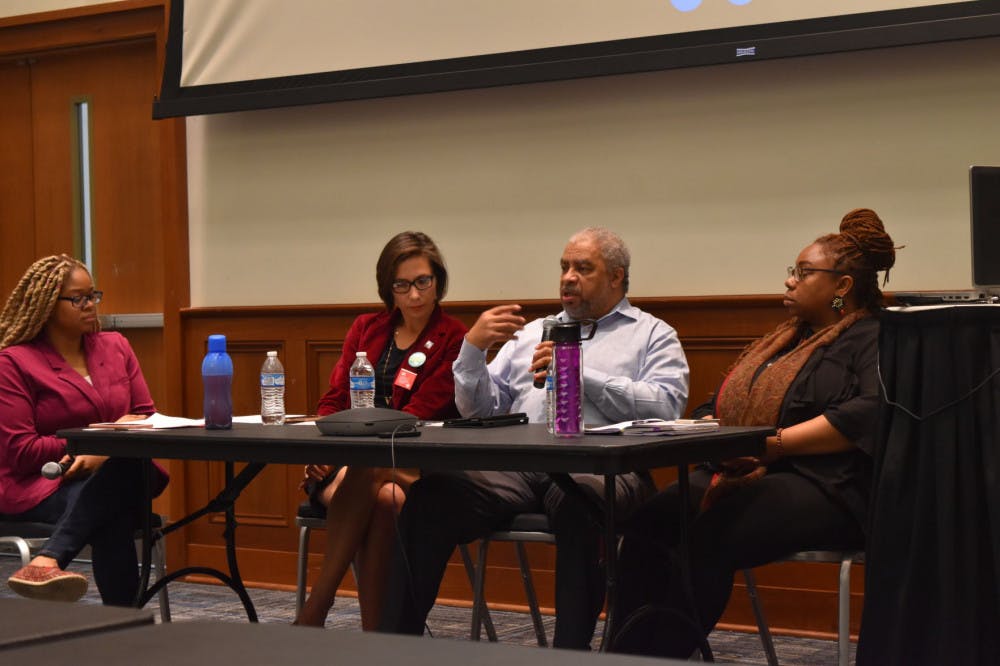Giovanni Dortch, an adjunct instructor in the Department of Sociology at the University of Memphis for five years, said adjunct professors experience issues like low pay, temporary and unreliable employment, little to no employee benefits, lack of advancement opportunities and overcrowded classes.
“The downside has been massively large classes [50-99 students] without support for grading or access to teaching assistants,” Dortch said. “Of course, another downside is having my labor undervalued and being underpaid for it but really having few options as the structure of the university is so reliant on temporary labor.”
As opposed to the traditional university model of full-time employment, adjunct professors are hired by a university on a part-time basis with no guarantee of employment semester to semester and no health or retirement benefits. The maximum pay for an adjunct professor in Tennessee if they teach a full load is $16,800 a year, according to the Tennessee Board of Regents, the largest system of higher education in Tennessee.
At the U of M, adjuncts are only allowed two courses per semester. The U of M is made up of 35 percent part-time faculty, who receive $700 per credit hour, which is below the poverty line. Most part-time faculty members also share one communal office and have no formal orientation to the university.
Dortch said even with the issues adjunct teachers face, she is still thankful to be able to teach.
“I enjoy the work, and I appreciate the opportunity to connect with students and watch them broaden their horizons and grow,” Dortch said. “As a black woman, and the only one in my current department, I have had the opportunity to mentor other black women students who have felt alienated on the campus in terms of faculty diversity, and that’s been incredibly fulfilling.”
Margaret Cook, vice president of the Memphis Chapter of United Campus Workers, an organization that fights for economic justice and democracy on campus and across Tennessee, said there are many things to be fought for on behalf of adjuncts, such as regular and prompt pay periods.
“Often, adjuncts are not getting a paycheck until after teaching for six to 10 weeks,” Cook said. “They should not have to wait this long to be paid for the work they are doing.”
Cook said they are also fighting for job security, which would entail long-term contracts, along with a course prep fee.
“If a course that an adjunct has signed a contract for is cancelled within a week of its start date, the adjunct should be compensated for the work they’ve done to prepare for this course,” Cook said.
Cook, along with adjuncts, held a meeting in the University Center on Thursday night for a panel discussion on adjunct labor and poverty in higher education. Cook said the goal of this meeting was to inform the public about the working conditions of adjuncts and ask them to join United Campus Workers to fight for their rights.
At the panel discussion, four professors spoke on their views of adjuncts. Some of them, like John Gilmore, adjunct professor at both the U of M and Christian Brothers University, spoke on his experience being an adjunct professor at the U of M for 19 years.
“I’ve been teaching here at the U of M since 1999,” Gilmore said. “I’ve seen a lot of the changes that have happened here.”
Gilmore said he does not receive benefits as a part-time adjunct faculty member, and the only difference in a regular professor and an adjunct is the pay, benefits and the opportunities they get.
“The adjuncts I know, including myself, we put in the time and the work,” Gilmore said. “There aren’t any shortcuts we get to take.”
Gilmore said he feels left out of many things on campus. This year, Gilmore was invited to a faculty meeting with his department for the first time in his 19 years of employment.
Jay Adkins, a former adjunct professor in the journalism department at U of M, said he was not treated well during his time teaching.
“Adjuncts at U of M are treated as placeholders,” Adkins said. “My boss … was very good to me, but the higher ups were never as nice.”
Adkins said adjuncts were never mentioned at journalism events, they did not receive parking at U of M, and the pay they receive is “atrocious.”
“After seven years of working there, I never received a thank you or anything for my work when I was let go,” Adkins said. “After the way I was treated, I won’t ever be coming back.”
Panelists of the Adjunct Pay and Poverty in Higher Education discussion address the room in the University Center. The panelists were, from left, Rebekkah Mulholland, PhD candidate and part-time history instructor; Amanda Lee Savage, history instructor and advisor; John Gilmore, adjunct anthropology professor; and Giovanni Dortch, adjunct sociology instructor.






